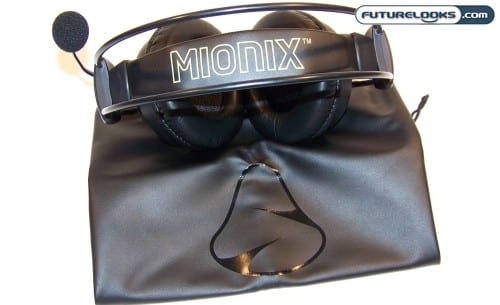Testing Configuration and Notes
Now that quite a few headsets are starting to come across the test bench, new testing methods have been developed in order to point out their strengths and weaknesses. In order to help keep it simple, the headset will be rated on Comfort, Audio Performance, Construction Materials, and Value.
Here’s the breakdown of the test system used:
- Intel Core i7 870 “Lynnfield” Processor
- GIGABYTE GA-P55A-UD6 Motherboard
- BGears Enspirer 7.1HD Audio Card (Oxygen CMedia Codec)
- Kingston HyperX 4GB 2133MHz Memory
- Zotac Geforce GTX285 Video Card
- Corsair HX750 Power Supply
To test the headset, Crysis (FPS), War Hammer Online (RPG), and Need For Speed Shift (Racing) video games were used due to their excellent sound tracks and audio options.
The Keid 20 Test Results

Comfort gets an A. Despite the very soft, plush ear cups, they actually fit quite well over the ears while the head pad holds the headset in place. They put very little pressure on the ears. The head band spreads any weight out evening making them very comfortable to wear. You should easily be able to wear these for long periods of time without the need for shifting or adjusting.
Audio Performance gets a C. It’s important to pair performance gaming headsets with a decent audio source, if you want the best they have to offer. In this case, the audio coming through the headset is very clear and distortion free all the way up to max producing clean mid-range and high frequencies. However, the bass is a bit weak which you mainly notice during explosive game play. The open cup design is the most possible culprit as the perforations may not be providing enough of a seal for good sound pressure.
There is a bit of a “cone” effect, or echo. Ambient noise can be heard which further drowns out some of the audio performance. To give you an idea, I could easily hear myself typing on my MS Ergo keyboard when wearing the headset. That may not be an issue for regular gamers as one can just turn up the volume a bit. But, die hard pros might not be so forgiving.
To trouble shoot the headset a bit, I found that cupping my hands around one side actually improved the lows a bit and blocked more of the ambient noise. So, it’s going to really be up to the “ear of the beholder” as to who is willing to deal with the outside noise and who isn’t.
On the bright side, the perforations in the headset do indeed provide a little air for the ears, which aids in their long term comfort. It really is a trade off.
Construction gets an A. The headset should be commended for using sturdy light weight materials and excellent choice of braided wiring. The Keid 20 will easily survive a drop or a small toss as they are very flexible. However, after handling the inline volume controller, the plastic is a little thin making it the piece most likely to fail if it gets roughed up too much.
Value gets a C. Rating this one was a bit tough since there is only one retailer seen selling them online. Obviously, more retailers could help lower prices which we hope will happen. Otherwise, the Mionix Keid 20 headset can be found for $75.00US at Medusa USA making them one of the more expensive choices available in a sea of many substitutes.
Final Thoughts

The Mionix Keid 20 Gaming Headset are well on the right path to gaining the affections of gamers. They offer many of the admirable qualities the basic gamer would expect in a good headset. They are very comfortable, produce decent mid-range frequencies, look pretty darn cool, and are made with a mostly sturdy set of construction methods and materials that ensure they’ll live a long happy life
The open ear design is really a trade off as its characteristics may prove to be the deciding factor for the more avid, pro-gamers who may play a lot at LAN parties where there is a lot of ambient noise. It’s nice to have ventilated ear cups during prolonged use, but some ambient noise does get directed through the ear cups. At the same time, since very few folks play games in loud environments all the time, it could be a moot point especially in your own room.
After checking out the rest of Mionix’s cool gaming-ware, we’re definitely curious what they will follow up with next. In the meantime, we give the Mionix Keid 20’s a nod of acknowledgment and hope that economies of scale bring the price inline with other substitutes. Then hopefully the “star system” can shine a little brighter.
Pros:
- Attractive head set
- Comfortable to wear for long periods
- Clear mid and high frequencies
- 50mm Drivers for effortless volume
- Noise cancellation works well
- Lightweight, sturdy construction
Cons:
- Open design captures ambient noise
- Weak low frequency ranges
- The $75 price tag could be a bit much
Overall Rating: 8.0/10.0
Love This Review? Hate This Review? Tell Us In The Forums!
